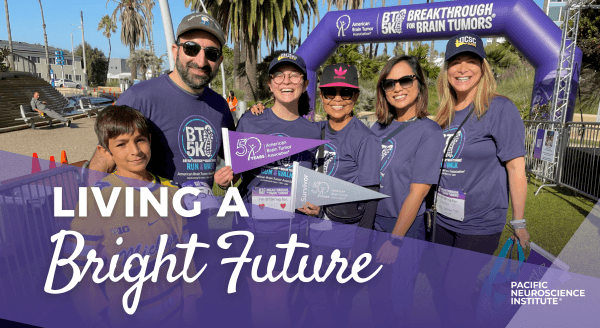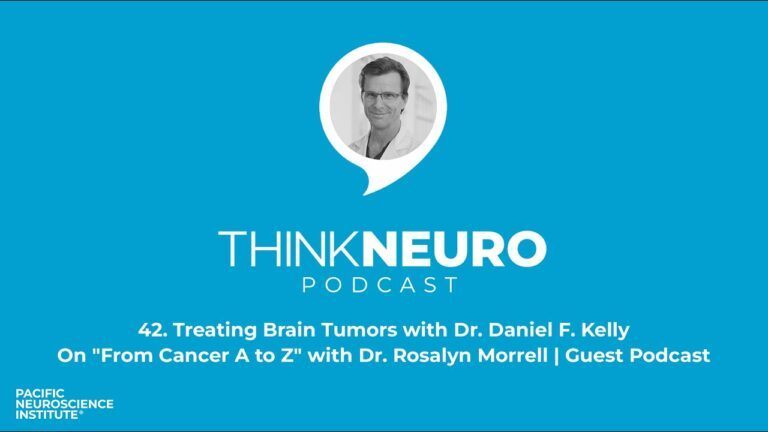
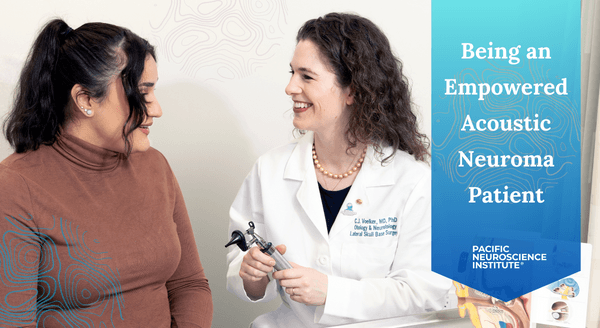
Being an Empowered Acoustic Neuroma Patient
by Courtney Voelker
A guide to informed healthcare decision-making for people living with acoustic neuroma (aka vestibular schwannoma)
Introduction
Receiving a diagnosis of acoustic neuroma (AN) can be overwhelming and frightening. However, taking an active role in your healthcare journey is crucial to ensuring the best possible outcome. As an AN patient, becoming educated and prepared for your appointments is essential for making informed decisions about your treatment. In this article, we will discuss the importance of being well-informed and provide valuable tips on how to prepare for your physician consultation.

Preparing for your physician consultation
- Compile a Comprehensive List of Symptoms
Start by listing all the acoustic neuroma-related symptoms you’ve been experiencing, no matter how minor they may seem. Symptoms can vary widely, including hearing loss (gradual or sudden), tinnitus, balance issues, dizziness, facial weakness or twitching, facial numbness, and others. Note the frequency and severity of each symptom, as well as when they first appeared. This detailed information will be invaluable for your physician in understanding your condition. - Document the Impact of Acoustic Neuroma on Your Life
Describe how your symptoms are affecting your daily life. Are they interfering with work, relationships, or hobbies? Be specific about the challenges you face. This will help your physician gauge the urgency of your treatment and tailor their recommendations accordingly.

Choosing the Right Physician
- Consult with Experienced Acoustic Neuroma Specialists
Acoustic neuroma is a relatively rare condition, and not all physicians have equal expertise in its diagnosis and treatment. Seek out specialists who have experience in treating acoustic neuromas. These specialists include neurotologists (a subspecialty of ear nose and throat surgery), neurosurgeons, and radiation oncologists.
- Seek Recommendations
Ask your primary care physician for recommendations or referrals to an acoustic neuroma specialists. Additionally, consider seeking out support groups such as the Acoustic Neuroma Association (ANA) or online forums where AN patients share their experiences and recommend physicians. - Verify Credentials
Ensure that the physician you choose is board-certified and has a history of successful AN treatment. You can also inquire about their experience and ask for patient testimonials or case studies.

What Your Physician Needs to Know
- Share Your Medical History:
Be prepared to discuss your medical history, including any previous surgeries, medical conditions, or medications you are currently taking. This information can impact your treatment options. Have all medical records related to your acoustic neuroma ready for the physician. This should include all hearing tests (audiograms) and imaging (MRIs and CT scans). Your physician will evaluate your level of hearing and if your tumor is growing or staying stable over time. Your physician may order more tests in order to help you make a treatment decision. - Discuss Your Goals and Concerns:
Clearly communicate your treatment goals and any concerns or preferences you may have. An open and honest dialogue with your physician will help tailor your treatment plan to your individual needs.
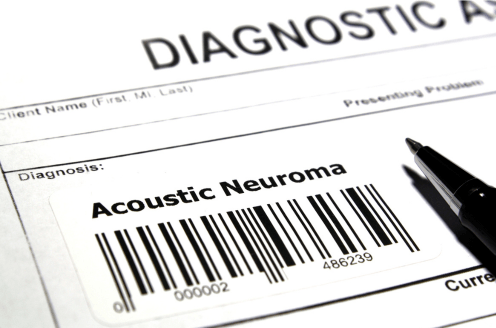
Becoming an Educated Patient
- Research Acoustic Neuroma:
Take the time to educate yourself about acoustic neuroma. Understand the anatomy of the inner ear, internal auditory canal, and cerebellopontine angle where the AN grows. Read about, the various treatment options available (surgery, radiation therapy, or observation), and potential risks and benefits associated with each. Reliable sources of information include medical journals, reputable websites, and books written by experts in the field. In the case of surgery, if hearing loss can be treated by a cochlear implant, find out if you are a qualified candidate for an implant at the time of surgery.
- Ask Questions:
Do not hesitate to ask your physician questions during your appointments. Write down your questions in advance and bring them with you. Knowledge is empowering, and your physician should be willing to address your concerns. - Consider a Second Opinion:
Seeking a second opinion can provide you with additional perspectives on your condition and treatment options. It can help you make a more informed decision about your care.
In summary, being an informed and proactive acoustic neuroma patient is vital for managing your condition effectively. By compiling detailed symptom information, selecting experienced healthcare providers, sharing relevant medical history, and educating yourself about AN, you can collaborate with your physician to develop a personalized treatment plan that best suits your needs and goals. Remember that you are in control of your healthcare journey, and your active involvement can lead to the best possible outcome.
Multispecialty team approach for Acoustic Neuroma
At Pacific Neuroscience Institute® (PNI®), our experienced team of specialists take a holistic approach. With shared decision making, the patient and family are involved at every step of the way to ensure the best outcomes for each patient focusing on quality of life.
Neurotology-Skull Base Surgery: Dr. Courtney Voelker, MD, PhD (DPhil Oxon); ANA Medical Advisory Board Member
Neurosurgery: Daniel Kelly, MD; Garni Barkhoudarian, MD; Walavan Sivakumar, MD
Otolaryngology-Head & Neck Surgery, and Facial Plastic & Reconstructive Surgery: Amit Kochhar, MD
Neuro-ophthalmology: Howard Krauss, MD
Laryngology – Voice & Swallow: Omid Mehdizadeh, MD
Audiology: Rebecca Lewis, AuD
Psycho-Oncology: Shanthi Gowrinathan, MD
Adapted from original article in the March 2024 issue of Acoustic Neuroma Association Newsletter.
Articles Related to Acoustic Neuroma
Videos Related to Acoustic Neuroma
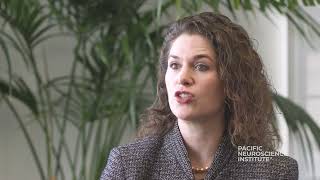 A PNI Minute | Acoustic Neuroma with Dr. Courtney Voelker
Dr. Courtney Voelker explains about acoustic neuroma, a benign tumor that affects the nerve for hearing and balance. Find out about signs and symptoms, and the three treatment options that…
A PNI Minute | Acoustic Neuroma with Dr. Courtney Voelker
Dr. Courtney Voelker explains about acoustic neuroma, a benign tumor that affects the nerve for hearing and balance. Find out about signs and symptoms, and the three treatment options that…
 Acoustic Neuroma: Surgical Approaches & Reconstruction | Drs. Courtney Voelker & Garni Barkhoudarian
In this installment of the Acoustic Neuroma Association (ANA) Support Group webinar series, Pacific Neuroscience Institute (PNI) experts Courtney Voelker, MD, PhD, and Garni Barkhoudarian, MD, present “Surgical Approaches and…
Acoustic Neuroma: Surgical Approaches & Reconstruction | Drs. Courtney Voelker & Garni Barkhoudarian
In this installment of the Acoustic Neuroma Association (ANA) Support Group webinar series, Pacific Neuroscience Institute (PNI) experts Courtney Voelker, MD, PhD, and Garni Barkhoudarian, MD, present “Surgical Approaches and…

A PNI Minute | Acoustic Neuroma with Dr. Courtney Voelker
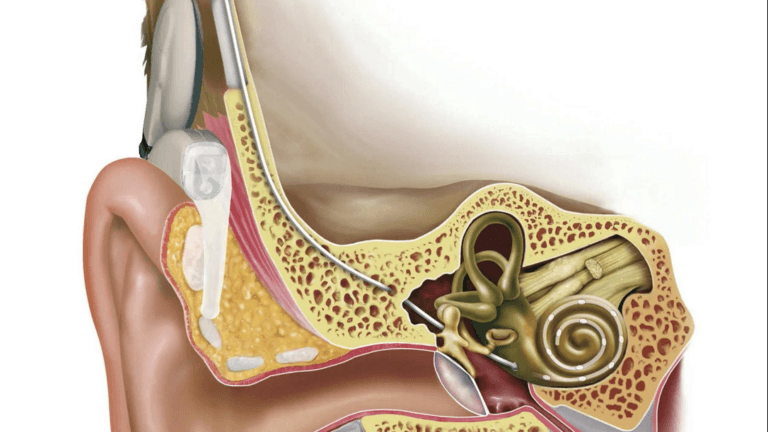
Acoustic Neuroma: Surgical Approaches & Reconstruction | Drs. Courtney Voelker & Garni Barkhoudarian
About the Author

Courtney Voelker
Courtney C.J. Voelker, MD, PhD (DPhil Oxon), is a Rhodes Scholar neurotologist, and otolaryngology – head & neck surgeon. She is Director of Otology/Neurotology-Lateral Skull Base Surgery, and Director of the Adult & Pediatric Cochlear Implant program at Pacific Neuroscience Institute® in Santa Monica, California. Dr. Voelker specializes in adult and pediatric cochlear implant surgery for hearing restoration. She developed PNI’s enhanced treatment protocol for acoustic neuromas—brain tumors that can affect hearing—where a cochlear implant can be placed at the time of tumor removal—a unique feature available at few institutions. Dr. Voelker offers expert, compassionate care to all her patients and is a member of the Acoustic Neuroma Association Medical Advisory Board.
Last updated: May 14th, 2024
